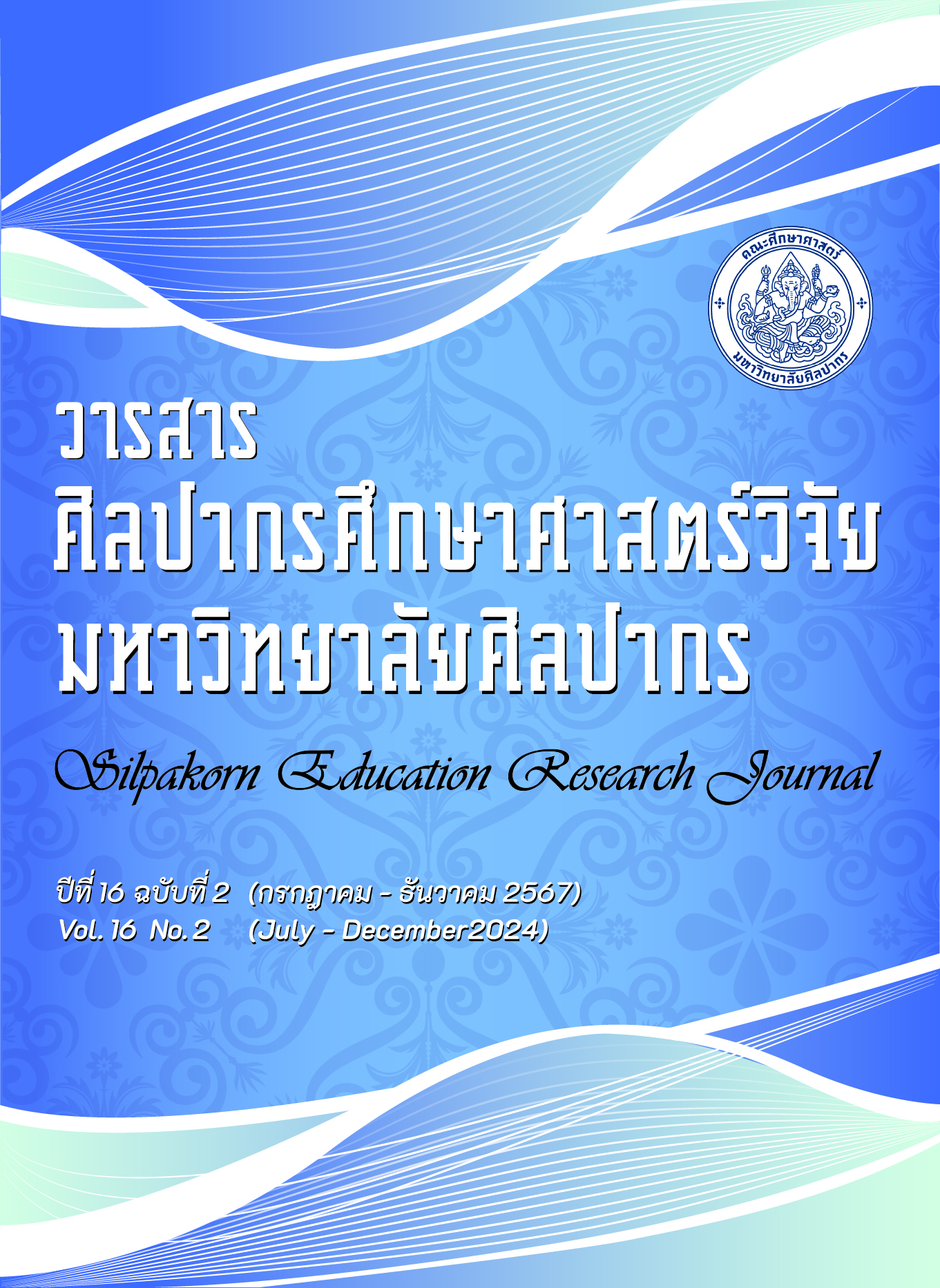ผลการจัดกิจกรรมการเรียนรู้โดยใช้เทคนิคการเรียนแบบสืบสอบความรู้เป็นกลุ่ม ที่มีต่อความสามารถในการแก้ปัญหาทางการคำนวณของนักศึกษาชั้นปีที่ 1 หลักสูตรเทคโนโลยีบัณฑิต มหาวิทยาลัยสวนดุสิต
คำสำคัญ:
การจัดการเรียนรู้, เทคนิคการเรียนแบบสืบสอบความรู้เป็นกลุ่ม, ความสามารถในการแก้ปัญหาบทคัดย่อ
Alper, T., and Inceoglu, G. (2017). Effect of Problem-based Learning on Students' Achievement in Using Computer-Aided Design Software. Journal of Educational Technology and Society, 20(1), 36-46.
Andik, A. (2020, August 8). Study on Computational Thinking as Problem-solving Skill: Comparison Based on Students Mindset in Engineering and Social Science. Universitas Negeri Yogyakarta. https://www.researchgate.net/publication/.
Bachelor of Technology Program in Information Technology. (2022, May 24). TQF.2 Program in Information Technology. https://it-btech.dusit.ac.th/wp-content/uploads/2022/04/TQF2 _65.
Cheng, Y. P., Lai, C. F., Chen, Y. T., Wang, W. S., Huang, Y. M., and Wu, T. T. (2023). Enhancing Student's Computational Thinking Skills with Student-Generated Questions Strategy in a Game-based Learning Platform. Computers and Education, 200, 1-20.
Keereerat, C. (2019). Using the Problem-Solving and App Inventor to Develop Computational Thinking Skill for High School Students. Journal of Education Studies, 47(2), 31-47.
Khaemmanee, T. (2017). Teaching Science: Knowledge for Organizing Effective Learning Processes. (1st ed.). Chulalongkorn University Press. (in Thai)
Ministry of Education. (2022, August 20). National Education Act BE 2542 (1999). https://www.onesqa.or.th/upload/download/file_697 c80087 cce7f0f83ce0e2 a9820 5aa3.pdf (in Thai)
Panich, V. (2012). Innovative Pathway of Learning in 21st Century. (4th ed.). SodsriSaritwong Foundation. (in Thai)
Savery, J. R., and Duffy, T. M. (1995). Problem-based Learning: An Instructional Model and It’s Constructivist Framework. Educational Technology, 35(5), 31-38.
Thangnatee, K., and Thanapatmeemanee, H. (2022). Blended Learning Activities by using Group Investigation (GI) to Enhance Computational Thinking Skills of Secondary 1 Students. Journal of Educational Technology and Communications Faculty of Education Mahasarakham University, 5(15), 113-136. (in Thai)
Whitehead, A. N. (1967). The Aims of Education and Other Essay. The Free Press.
Wongyos, S. (2023). Development of the Self Study Package Entitled Computational Thinking in Accordance with the SEASES Model to Enhance Problem-solving Skillsfor Grade 8 Students. Journal of Humanities and Social Sciences Nakhon Phanom University, 13(2), 177-188.
เอกสารอ้างอิง
Alper, T., and Inceoglu, G. (2017). Effect of Problem-based Learning on Students' Achievement in Using Computer-Aided Design Software. Journal of Educational Technology and Society, 20(1), 36-46.
Andik, A. (2020, August 8). Study on Computational Thinking as Problem-solving Skill: Comparison Based on Students Mindset in Engineering and Social Science. Universitas Negeri Yogyakarta. https://www.researchgate.net/publication/.
Bachelor of Technology Program in Information Technology. (2022, May 24). TQF.2 Program in Information Technology. https://it-btech.dusit.ac.th/wp-content/uploads/2022/04/TQF2 _65.
Cheng, Y. P., Lai, C. F., Chen, Y. T., Wang, W. S., Huang, Y. M., and Wu, T. T. (2023). Enhancing Student's Computational Thinking Skills with Student-Generated Questions Strategy in a Game-based Learning Platform. Computers and Education, 200, 1-20.
Keereerat, C. (2019). Using the Problem-Solving and App Inventor to Develop Computational Thinking Skill for High School Students. Journal of Education Studies, 47(2), 31-47.
Khaemmanee, T. (2017). Teaching Science: Knowledge for Organizing Effective Learning Processes. (1st ed.). Chulalongkorn University Press. (in Thai)
Ministry of Education. (2022, August 20). National Education Act BE 2542 (1999). https://www.onesqa.or.th/upload/download/file_697 c80087 cce7f0f83ce0e2 a9820 5aa3.pdf (in Thai)
Panich, V. (2012). Innovative Pathway of Learning in 21st Century. (4th ed.). SodsriSaritwong Foundation. (in Thai)
Savery, J. R., and Duffy, T. M. (1995). Problem-based Learning: An Instructional Model and It’s Constructivist Framework. Educational Technology, 35(5), 31-38.
Thangnatee, K., and Thanapatmeemanee, H. (2022). Blended Learning Activities by using Group Investigation (GI) to Enhance Computational Thinking Skills of Secondary 1 Students. Journal of Educational Technology and Communications Faculty of Education Mahasarakham University, 5(15), 113-136. (in Thai)
Whitehead, A. N. (1967). The Aims of Education and Other Essay. The Free Press.
Wongyos, S. (2023). Development of the Self Study Package Entitled Computational Thinking in Accordance with the SEASES Model to Enhance Problem-solving Skillsfor Grade 8 Students. Journal of Humanities and Social Sciences Nakhon Phanom University, 13(2), 177-188.





